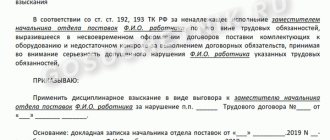What are the punishments?
The types of punishments are listed in Art. 192 Labor Code of the Russian Federation:
At the same time, Art. 189 of the Labor Code of the Russian Federation allows other punishments to be applied to certain categories of workers. For example, employees of the Ministry of Internal Affairs - in the form of a severe reprimand, a warning about incomplete official compliance and transfer to a lower position.
The procedure for bringing to disciplinary liability is the same for all types of penalties. It is important to remember that you can punish an employee if he is familiar with the internal regulations. Therefore, the organization must develop and approve such documents. They must clearly state the procedure for hiring and dismissal, labor discipline, duties of employees and employers, responsibility, work hours, rest periods, possible incentives and penalties, and other issues governing labor relations.
Grounds for recording a violation
Any defect committed during working hours and related to the performance of official duties is regarded as a violation. Violation may result in punishment.
Examples of “neglect” of work issues:
- Intentional errors in accounting documents that led to a decrease in income and bankruptcy. Corruption for the purpose of enrichment.
- Damage to property on a large scale. Theft of items that are on the balance sheet of the enterprise (including under the pretext of write-off).
- Inappropriate behavior.
- Appearing at the workplace in a state of alcoholic, toxic or drug intoxication.
- Absence from work for a long time without good reason (three to four hours are taken into account).
- Failure to fulfill duties prescribed by job description.
- Disclosure of personal data, information about third parties, information that became known during the performance of a job function.
- Providing false documents when applying for a job that distort the true state of affairs.
- Violation of labor protection rules, which resulted in a threat to the life and health of people.
What is the penalty for systematic violation of labor discipline? Examples
When labor discipline is violated, no one should remain silent. To ensure that violations do not become systematic, forms of punishment such as reprimands and reprimands are used:
A reprimand is a form of disciplinary action. An order is issued in this regard. The notice will be lifted after exactly one year.
A reprimand is a form of disciplinary action. Legal sanction is applied under Article 192 of the Labor Code of the Russian Federation. This is an average measure of responsibility, something between dismissal and reprimand.
The statute of limitations for filing this type of offense is 6 months, and if accounting errors are identified – 2 years.
Violations of labor discipline: examples and consequences
Violations of discipline are of two types: minor offenses (such as being late or failing to complete official tasks on time) and serious violations, these include:
- absenteeism,
- theft of property,
- causing intentional damage,
- theft,
- misleading management
- refusal to comply with the manager's demands.
If minor offenses are regularly repeated, we can talk about a gross violation of internal regulations and the application of disciplinary measures to the negligent employee. You can apply a mild punishment in the form of a reprimand or reprimand or deprive of a bonus.
In the event of a serious breach of discipline, such as health and safety regulations, the employer has the right to dismiss the employee.
How is a violation formalized?
The employer should follow the procedure for documenting the violation and be careful about the deadlines. Otherwise, the punishment may be challenged in court.
An order for disciplinary action may be issued no later than one month from the date of discovery of the offense and no later than six months from the date of its commission. It should be taken into account that this time does not include periods during which the employee was absent from the workplace for valid reasons - see Art. 193 Labor Code of the Russian Federation.
- When applying for employment, a citizen must familiarize himself with the rules of labor discipline at the enterprise by signature.
- The offense must involve the fault of the subordinate.
- The fact of violation must be documented using an act, which is drawn up in the presence of two witnesses and signed by them.
- The director is obliged to demand an explanatory statement from the employee, which he must provide within two days. In case of refusal to give explanations, an appropriate act should be drawn up.
- The order to punish the employee must be read and signed. This must be done no later than three working days from the date of its publication. In case of refusal to sign a document, this fact should be reflected in the act.
Penalties imposed in the form of a reprimand or reprimand are valid for exactly one year from the date of their issuance. In some cases, by decision of the employer, the penalty may be lifted before the expiration of this period.
Employees who believe that they have been punished unfairly can appeal the employer's decision by filing a lawsuit in court.
A special type of penalty is dismissal
Dismissal is a last resort and should only be used if there are compelling reasons. For example, in the case where an employee committed a one-time, but serious offense, or repeatedly failed to perform duties without good reason.
Gross violations include:
- absenteeism,
- showing up at work under the influence of alcohol or drugs,
- disclosure of secrets protected by law,
- theft or embezzlement of material assets,
- gross violation of labor protection requirements, which entailed grave consequences.
Dismissal is often preceded by a light disciplinary sanction. Moreover, in the case of repeated violations, before dismissal, the employer must reprimand or make a reprimand, and only after a repeated offense dismiss the employee.
How does dismissal for being late work?
Is it possible to fire an employee for violating labor safety requirements?
There is no very concept of being late in the Labor Code, but there is a clause that obliges the employee to be at the workplace during the entire working time, except for the lunch break. If working hours have already begun, and the boss does not see the employee on site, this is a violation; its significance varies depending on the specifics of the work.
In most cases, being late does not harm the work of the organization; sometimes employees have the right to arrive 15 minutes later. If the employee still does not fit into these frameworks, the step-by-step instructions look like this:
- In the first case - an explanatory note and a remark if the reason was insignificant.
- Repeated lateness - explanatory and reprimand if there is already a remark.
- The third lateness means dismissal if there is a reprimand.
In practice, employees whose presence on site depends on the work of their colleagues are fired for being late.
Is it possible to remove a charge?
A disciplinary sanction can be lifted early either on the initiative of the trade union (or immediate supervisor) or on the initiative of the employer.
In the first case, a document on early lifting of a disciplinary sanction (an employee’s statement, a memo from the immediate supervisor or a petition) is agreed upon with the head of the organization, and then an order is issued.
In the second case, the employer, on his own initiative, issues an order to lift the penalty.
In addition, in Art. 194 of the Labor Code of the Russian Federation establishes that if the employee has not been subjected to another disciplinary punishment within a year after being hired, the penalty is canceled.
What is the definition of a disciplinary offense?
Article 192 of the Labor Code of the Russian Federation defines a disciplinary offense as failure to fulfill or incomplete, poor-quality performance of labor duties assigned to a citizen. Analysis of labor legislation allows us to identify the main features of a disciplinary offense:
- An illegal action is being committed that violates official or labor discipline.
- The employee's actions are his fault.
- Unlawful and guilty actions are subject to disciplinary liability.
In this case, the employee’s job responsibilities can be specified:
- labor legislation;
- local acts establishing internal labor regulations;
- instructions (job descriptions).
A disciplinary offense is always associated with the existence of an employment contract, which must stipulate the responsibilities of a working citizen. If his actions do not affect the provisions of the employment contract, such an offense can be excluded from disciplinary action. An employee who has received an order from management that violates the law has the right to refuse to carry it out. This is also not a disciplinary violation of labor relations.
If the employee did not fulfill the duties assigned to him, but his guilt was not established during the proceedings, it means that he did not commit a disciplinary offense.
There is no list of disciplinary offenses, as mentioned above. However, it is possible to identify certain types of such offenses and assess their severity. When imposing a disciplinary sanction, this criterion must be taken into account.
Types of disciplinary sanctions
The currently valid Labor Code of the Russian Federation contains an exhaustive list of the types of disciplinary sanctions themselves.
This is important to know: Full payment upon dismissal of one’s own free will (Labor Code)
These include:
- remark (issued orally as a warning about the possible strengthening of existing punishments for committing certain offenses);
- reprimand (issued in the form of an order to impose such a penalty and can be withdrawn by decision of the manager at the appropriate level);
- dismissal for appropriate reasons (applied for the most serious offenses and must be formalized in the form of an order).
That is, in accordance with the current legislation, it is impossible to impose a fine as a disciplinary sanction, since this type of enforcement action does not apply to disciplinary measures.
In addition, it can only be imposed by a court by its decision for committing an administrative offense or a criminal offense.
Legal provisions on labor discipline
Labor discipline is regulated by the Labor Code of the Russian Federation. This document states that both employees and managers are required to comply with labor rules.
In turn, the employer is obliged to provide all conditions for compliance with general labor discipline standards.
Important . More information about labor discipline can be found in article number 189 of the labor code.
Based on the labor code, a special document must be developed within the enterprise, reflecting the set of internal rules in more detail. Most often, such a document is a local regulatory act.
Most often, internal documents contain provisions on the following obligations of employees:
- Compliance with work schedule or routine;
- Fulfillment of the established plan for the volume and quality of work done;
- Compliance with job descriptions when performing work tasks;
- Following occupational safety rules;
- Maintaining friendly relations with the team and subordination with management;
- Immediate response to emergency situations;
- Careful attitude towards the property assets of the enterprise and equipment;
- Carrying out orders issued by management legally.
In addition to the general rules, such a document must contain instructions that will be applied in case of violation of labor rules.
Examples of disciplinary action
only three types of punishments regulated by law for committing certain offenses the manager, when making a decision to impose a particular penalty, must be guided by the degree of severity of the violation committed.
Thus, disciplinary action for being late for work or a one-time violation of labor discipline, if they did not entail dangerous consequences, both for employees of a particular organization and for surrounding people, can be punished with an oral reprimand due to the “lightness” of such offenses.
At the same time, speaking about violations of labor discipline, it is necessary to remember that they also come in different forms.
Thus, drunkenness in the workplace is also a violation of labor discipline in the organization (as is smoking in unauthorized places), however, the violator will not be able to get away with a simple remark due to the gross nature of the offense; the punishment may be disciplinary action for violation of labor discipline, that is, dismissal .
Violation of labor protection requirements can entail quite serious consequences not only for the person who violated them, but also for other employees who may fall under the adverse consequences of such an offense.
And here the employer must independently decide what punishment or disciplinary sanction to apply to the violator for violating labor protection requirements, commensurate with his offense.
It is unlikely that you will be able to get away with a simple remark here, so the issue may also include dismissal on appropriate grounds.
You can also be dismissed for committing an offense such as theft (but the employer can also file a statement with the internal affairs authorities regarding the identified offense, already about initiating a criminal case under the relevant article).
That is, even the theft of gasoline, which is very widespread in motor transport enterprises, may not go unnoticed for the offender if the employer follows the principle and decides to punish the employee for theft of gasoline to the fullest extent of the law, so that others will be discouraged in the future.
The shortage of inventory items can also be included in this category of offenses (since these two types of offenses are very close to each other and interconnected).
And for it you can also receive a disciplinary sanction for a lack of goods and materials, such as dismissal (in the worst case), and in the best - a reprimand .
Failure to fulfill official duties is a very serious offense and the employee is punished by disciplinary action for failure to fulfill official duties, usually by dismissal of the employee under the relevant article of the Labor Code.
The same disciplinary sanction for corruption offenses can also be carried out if any corruption violations that resulted in harm to both the organization itself and those legal entities and individuals who depend on this organization.
And the most common type of disciplinary action for environmental misconduct is, again, dismissal.
But, in addition, if the relevant government authorities determine the extent of the damage caused, the person who committed such an offense may be subject, in addition to disciplinary action, to administrative punishment, and, if the damage caused to the environment is significant, to criminal punishment.
Arbitrage practice
If the dismissal procedure is not followed or deadlines are violated, the employee can challenge the very fact of dismissal in court. Let's consider the main controversial issues that can cancel the dismissal order:
- failure to comply with the procedure for recording absenteeism;
- discrepancy between the data specified in the report and reliable information (very often managers can overestimate the time an employee is absent from the workplace during the day);
- the employee’s disagreement with the transfer to another unit or another position, as well as violations in documentation;
- no request for explanations from the employee (no registered letter to the employee);
- exceeding the period allowed for imposing punishment.
If the court takes the employee’s side and the fact of absenteeism is interpreted as a forced absence, then judicial practice considers dismissal for violation of labor discipline as illegal.
The consequence of the appealed decision is the cancellation of the order to terminate the employment contract, reinstatement of the employee in the workplace, payment of compensation to the employee for moral damage, as well as his possible transfer to another unit.
A rather difficult case is protesting the dismissal of an employee for absenteeism who has a traveling job. In this case, the employer was able to fire an employee for absenteeism without evidence of such a fact.
The employee’s employment contract contained a clause about the traveling nature of the work, the employee did not have a specific workplace in the office and the working day consisted of a free schedule. The main inconsistency in proving the employee’s guilt was the discrepancy between the recorded data and the factual provisions proving his absence. In other words, if the employee was absent for several hours, the employee was protected from absenteeism for the entire day. When considering a similar case, the court sided with the employee and declared the employer’s actions illegal.
Termination of an employment contract on the basis of violation of labor discipline (for example, in the form of absenteeism) must be formalized in strict accordance with legislative norms, the deadlines established by law and in a certain manner. Violation of these actions can be protested by the employee, and the employer will be obliged to pay various compensations for moral damage caused during the time that the citizen was unemployed.
Legal registration
Before determining what kind of penalty will be imposed, the employer must find out exactly what offense was committed and in what form.
When applying a disciplinary sanction to an employee, regardless of the form of the latter, prepare documents that will confirm the employee’s guilt.
Otherwise, the order to impose punishment will be considered illegal and may be challenged, including in court.
Documentary evidence may include recordings from surveillance cameras, reports from the immediate supervisors of the person who committed the offense, information from working documentation confirming the fact of a violation.
After receiving such evidence of a misconduct, the head of the organization or unit entrusted with the responsibility of preparing orders to impose penalties requires the employee to provide an explanatory note.
They are attached to the text of the explanatory note and brought to the attention of the persons making the decision to impose a penalty.
If such an explanation was not taken from the employee, the order imposing punishment is considered invalid.
Based on the results of checking all the information confirming that the employee committed a disciplinary act, an act of disciplinary action for committing a disciplinary offense is drawn up, which reflects the essence of the act.
There is no single form for such an act, so each organization develops it independently.
a mandatory requirement for it : the act must be drawn up in writing, and the employee for whom it was prepared becomes familiar with its contents upon signature.
And such an act can be prepared no earlier than 2 business days after the employee provides an explanatory statement regarding the commission of an action considered a disciplinary offense.
Otherwise, as mentioned above, the order to impose a penalty will not be considered valid , and it can easily be challenged in court.
After drawing up such an act, a draft order to impose punishment is prepared. Moreover, it must be remembered that only one type of penalty can be imposed for one offense.
The order must reflect, first of all, the data of the employee on whom this or that penalty is imposed.
The essence of the committed act, as well as the time and timing of its discovery (or its results), must be indicated.
This is important to know: Labor Code: sick leave for child care
In addition, such an order must reflect documents confirming the discovery of the commission of the act or its results, as well as explanatory documents of the employee on whom the penalty is imposed.
It is best that in case of a challenge there will be no difficulties if all the specified documents are drawn up as appendices to such an order.
Not all employees of the organization in which this or that offense was committed can impose a disciplinary sanction, that is, sign an order regarding it.
The Labor Code of the Russian Federation clearly defines only two categories of employer representatives who have this right.
Firstly, it can be an individual, if he is the employer himself, and secondly, the management bodies of a legal entity or organization to which such powers have been transferred in accordance with the procedure established in the statutory documents.
It is extremely rare to encounter such cases when the imposition of penalties can be carried out by the heads of structural units in which the fact of a violation was recorded.
No one else, in accordance with current legislation, has the right to impose disciplinary sanctions.
But the employer, before making a decision to impose a particular penalty, must necessarily weigh the degree of guilt of the employee and the type of punishment that he wants to apply, since the imposition of any penalty can be appealed not only on the basis of incorrectness of its legal registration, but also on the basis of proportionality to the offense committed.
Didn't find the answer to your question? Find out how to solve exactly your problem - call right now:
basic information
Dear readers! The article talks about typical ways to resolve legal issues, but each case is individual. If you want to find out how to solve your particular problem , contact a consultant:
+7 (499) 110-43-85 (Moscow)
+7 (812) 317-60-09 (Saint Petersburg)
8 (800) 222-69-48 (Regions)
APPLICATIONS AND CALLS ARE ACCEPTED 24/7 and 7 days a week.
It's fast and FREE !
Discipline is part of the work time and process. All principles and fundamentals are regulated by the Labor Code of the Russian Federation. Failure to fulfill these obligations correctly will result in a fine or other sanctions. These include dismissal or administrative punishment.
The issue is regulated by paragraph 6, article of the Labor Code, if the offense is not entered in the work book. If this is a failure to fulfill duties, then it is regulated by Article 192 of the Labor Code of Russia.
In accordance with current legislation, a citizen undertakes:
- perform your duties at the proper level;
- comply with labor standards and adhere to discipline;
- observe safety measures;
- protect the company's property;
- warn management if there is a threat to the lives of others.
If an employee has not fulfilled at least one of the above requirements, then he can be punished. Dismissal is used extremely rarely, as it is considered a punishment for serious violation.
If the employer insists that it is necessary to fire an employee for violating labor discipline, then it is necessary to take the action in the correct manner.
The procedure is accompanied by several stages:
- Initially, the employer must record the fact of the violation. This is the most important stage and it must be documented only in writing. The examination is formalized only with the help of a specially created examination or when drawing up a protocol. All evidence should be attached to the evidence base, including video recording or photo evidence;
- warning. If a citizen is considered a highly qualified employee, but he has committed a disciplinary offense, then the employer has the right to issue only a warning;
- acquaintance. If the employer has collected all the necessary evidence, then the company has the right to prepare an appropriate order for recovery. The employee gets acquainted with the issued order upon signature. If you refuse to sign it, you should draw up an act in the presence of witnesses;
- receiving an explanatory note from the employee. It is also considered an important procedure during an investigation. If an employee is constantly late, then he is obliged to provide an explanation every time.
Violations of labor discipline and responsibility for them
According to labor legislation, internal labor regulations must be developed and approved at each enterprise. Such a document serves as the main instruction for employees of the enterprise, and these rules prescribe all the nuances of the labor process and labor discipline: from the start time of the working day to the procedure for issuing bonuses and maintaining the trade secrets of the enterprise.
It would seem that there is such a particularly terrible thing if you come to work a minute later than the official start of the working day? But in fact, this is a violation of labor discipline, which can entail serious penalties. Let's try to figure out what compliance with labor discipline consists of, what offenses can be considered as a violation of it, and how this threatens the employee.
What is labor discipline?
Each enterprise is a complex mechanism, the smooth functioning of which depends on the quality of work of each component part. Before moving on to discussing violations, let’s understand what labor discipline is. It can be defined as a set of rules that are mandatory for all employees (from ordinary to managers) that are adopted at the enterprise. Their list includes:
- labor protection rules;
- internal regulations;
- corporate ethics.
The specified documents (codes, memos, etc.) are developed and approved by employers. Supervision of implementation and provision of favorable conditions for compliance with requirements is also entrusted to them. The application of penalties is lawful in the event of a violation of the duties established by law by an employee. The Code defines their list in article number 21. Among the responsibilities:
- conscientious fulfillment of the terms of the employment contract;
- compliance with the company's internal regulations;
- compliance with labor discipline;
- compliance with labor protection and safety requirements;
- responsible attitude towards the property of the employer, other employees and third parties (for the safety of whose property the employer is responsible);
- compliance with established labor standards;
- timely notification of an emergency situation that threatens the lives of employees or the property of the employer.
Violation of labor discipline - definition and types
Labor discipline is a set of rules of conduct adopted by the enterprise (labor safety rules, internal labor regulations, corporate ethics, etc.) that are obligatory for all employees of an enterprise (from management to ordinary employees). An important nuance is that the employer is not only obliged to develop and approve such rules, but also to provide conditions for their proper implementation - otherwise, failure to fulfill labor duties and failure to comply with labor discipline is not the fault of the employee.
In order to apply penalties to an employee for a violation, it is necessary to determine what constitutes a violation of labor discipline. And to do this, you first need to clearly understand what is included in the concept of labor discipline.
Responsibilities of the employee
According to the Labor Code of the Russian Federation, an employee is obliged to:
- comply with labor standards established at the enterprise;
- conscientiously perform official duties;
- comply with labor protection rules, internal labor regulations, Regulations on trade secrets and the requirements of other regulatory documents adopted by the enterprise;
- treat the property of the enterprise with care;
- If a situation arises that threatens people’s health or life, or the safety of the enterprise’s property, immediately notify the immediate supervisor.
Violation of any of the above points is considered a violation of labor discipline.
Types of labor discipline violations
Depending on the norms of the labor process, the following three types of violations of labor discipline by an employee are distinguished:
- technological (violation of technological standards);
- violation of subordination and coordination in the process of labor management (violations of management norms);
- violation of working hours and rest time (violation of regime norms).
Thus, the release of defective products due to the fault of an employee will be a technological disciplinary offense, and, for example, absenteeism can be considered a violation of regime norms.
Depending on the type of violation, the causes of the incident are investigated and the necessary documents are collected.
List of labor discipline violations
The main violations of labor discipline are usually considered:
- violation of labor safety rules leading to an accident or incident;
- appearing at the workplace in a state of drug, alcohol or other toxic intoxication;
- absenteeism;
- regular lateness to the start of the working day and after the lunch break;
- leaving work early for lunch breaks and at the end of the shift;
- theft of work property, embezzlement, damage to equipment and other property of the enterprise;
- performance of one’s work duties not in full, not in accordance with established quality criteria (improper performance of one’s duties);
- disclosure of a commercial secret of an enterprise;
- refusal to undergo training or medical examination if this is necessary for the high-quality and qualified performance of work duties;
- immoral act;
- direct disregard of the manager’s orders;
- insubordination;
- deliberate failure to comply with instructions and orders;
- participation in activities that undermine the authority of the leader.
Several absences in a row, appearing at the workplace while intoxicated, theft, forgery of documents, as well as immoral acts are considered a gross violation of labor discipline.
It is also worth remembering that improper performance of duties may be as follows:
- at the place of performance;
- according to the deadline and time of execution;
- by volume of execution;
- according to the form of execution;
- by method of execution;
- by subject of execution.
Acts of violation of labor discipline are called disciplinary offenses.
It is necessary to add that it is necessary to distinguish between the financial liability of employees and disciplinary offenses, since financial liability can occur or continue after the end of the employment relationship if material damage to the enterprise was caused while the employee was listed as an employee of the enterprise.
Punishment for systematic failure to fulfill labor duties
How to fire an employee for failure to fulfill job duties if this happens all the time? The employer should pay attention to the reasons for such behavior of the worker. If the grounds are valid, the employee will be able to be reinstated in his position.
The concept of failure to fulfill labor duties
According to Article 21 of the Labor Code of the Russian Federation, upon taking office, an employee signs documents that contain his obligations, that is, the actions that he needs to perform. The correct concept of systematic violation is also recorded, that is, repeated failure to fulfill labor duties - this is:
- Absence of a worker from the workplace. Documents proving the need for this were not presented. The behavior became repeated.
- Systematic non-compliance with work and rest time, being late or leaving work early.
- Refusal to work after changes have been made to local regulations and internal regulations.
- Repeated violation of labor standards after the application or during the action of a disciplinary sanction.
- Regular fraudulent activities using official position.
It is important to know! The employee’s behavior is characterized as failure to fulfill job duties in violation of legal requirements, contractual agreements, internal regulations, job descriptions, orders systematically, constantly.
Legislative regulation
The main document regulating labor relations is the Labor Code of the Russian Federation. Its norms prescribe the prerogatives and obligations of the parties, the conditions for terminating agreements, and the measures applied to influence the individual:
- Article 21 sets out what an employee undertakes to do upon taking up a position and during the performance of work activities - fulfill the duties established by the contract, maintain discipline, take into account safety precautions, and take care of the company’s property. If one of the points is violated, and especially not for the first time, the consequence may be dismissal for repeated failure to fulfill job duties.
- If the employee does not have valid reasons for constantly failing to perform his functions, then the manager has the right under clause 5. Art. 81 terminate the employment agreement with him.
- Article 192 contains the types of disciplinary sanctions applied to the employee.
- Article 193 establishes the procedure for applying punishment.
Signs of violation of labor discipline
If the rules of law are misinterpreted, confusion occurs as to in what cases reduction is possible. Dismissal for improper performance of job duties will become legal only if a number of conditions are met. If at least one of them is missing, then the employee will be reinstated in his position through the courts:
- There is evidence of non-fulfillment of the labor function specified in the contract (absence from work or refusal to work due to changes in standards). For example: Parus LLC used time-based wages, but at the request of the employees, the company switched to piecework. Everyone was warned about the adjustments made two months in advance. Carpenter Ivanov N.I. refused to work. Previously, for systematic lateness, a man was subject to deprivation of his bonus. By order of the manager, dismissal was issued under Article 81, paragraph 5 of the Labor Code of the Russian Federation for failure to fulfill official duties.
- For no good reason. Labor legislation does not contain a list of grounds. When making a decision, the court is guided by generally accepted norms and previous practice. Legitimate reasons include illness, caring for a sick relative, and due to circumstances beyond the employee’s control – flood, fire.
- Repeated action. A repeated violation involves the commission of actions by an employee who has already been subject to penalties at the same place of work throughout the year.
- Confirmed by disciplinary action. An order from the director of an organization to apply liability measures against an employee is considered documentary evidence. The worker is introduced to it against signature within 3 days after publication.
- The violation was caused by the employee. The failure to comply was deliberate, deliberate or negligent. Another situation is due to independent circumstances (lack of proper working conditions).
Possible punishment options
The period of punishment is 1 year, with the exception of termination of the employment contract. With correction and good behavior, the term is reduced. According to Article 192 of the Labor Code of the Russian Federation, the employer has the right to choose measures to suppress violations in the form of:
- Notes. Used to warn an employee about the application of more stringent penalties. Issued orally or in writing, for one offense, without consequences.
- Rebuke. In relation to the remark, it is of a more serious nature. Used when the violation is repeated. Often accompanied by the obligation to pay a fine.
- Dismissal for systematic failure to fulfill job duties. An extreme measure used in cases of gross violation, ignoring comments, fines, or reprimands.
Penalties for violations of labor discipline
p>The penalties that the employer has the right to apply to the employee are prescribed in Article 192 of the Labor Code of the Russian Federation. These include:
At the same time, the employer also has the right to deprive the employee of a bonus (as part of a reprimand, if such a procedure is reflected in the internal documents of the enterprise).
For a certain category of employees whose labor duties are regulated by separate Federal laws, other penalties are also provided.
This is important to know: Order of the Ministry of Health 425n - on approval of the procedure for familiarization with medical documentation
Reprimand for violation of labor discipline
Upon the fact of an employee’s misconduct, an act of violation of labor discipline must be drawn up, which must reflect the essence of the offense, the explanations received from the employee and the remark received. The remark in itself does not threaten the employee with any special troubles, but it will be possible to talk about a systematic violation of labor discipline if the employee commits another disciplinary offense in the near future.
Reprimand for violation of labor discipline
A reprimand is issued for a disciplinary crime (misdemeanor) committed and can be ordinary or severe. The reprimand is not entered in the work book, but is recorded in the order; it is noted in the work book only if the employee is fired for improper performance of job duties and systematic violation of labor discipline.
Dismissal for violation of labor discipline
Dismissal is a last resort measure. It can be applied in the event of a systematic violation of labor discipline by an employee and failure to fulfill his duties, as well as in the event of a gross disciplinary offense.
For example, educational institutions may fire an employee who has committed an immoral act.
Responsibility for violation of labor discipline
According to labor legislation, each employee is responsible for maintaining labor discipline at the enterprise and each employee must be familiarized with the internal labor regulations, labor protection documents, job descriptions and other documents regulating his work activities, upon signature. If an employee violates labor discipline, the employer has the right to apply penalties at its discretion, depending on the severity of the offense.
The procedure for punishment for a disciplinary offense
The punishment for violation of labor discipline is established by the head of the enterprise on the basis of legal norms and available information.
Act on committing a disciplinary offense
When an employee commits any disciplinary offense, a corresponding act is drawn up. The document is drawn up by the employee’s immediate supervisor in the presence of two witnesses in two copies (one immediate supervisor passes it on to senior management to make a decision on penalties, the other copy is handed over to the employee). The form of the act and the employees responsible for drawing up the act must be approved by the internal labor regulations of the enterprise.
Employee's explanations
The employee is required to provide a written explanation regarding the disciplinary offense he has committed (it is recommended to require an explanation in writing so that this fact is recorded). If the employee refuses to give an explanation, this must be reflected in the act. The employee is given two days to provide explanations. It is worth mentioning that refusal to write an explanatory note will not save the employee from being sanctioned.
If the employee has provided an explanatory note, an act of violation and a report from the employee’s immediate superior are attached to it. This package of documents is transferred to senior management in order for a decision on recovery to be made.
Order to impose a penalty
After studying the circumstances of the disciplinary offense committed and studying all the documents, the head of the enterprise issues an order on violation of labor discipline.
There is no standard form for such an order (except for the dismissal order, which is drawn up according to forms No. T-8 and No. T-8a, approved by Resolution of the State Statistics Committee of Russia dated January 5, 2004 No. 1 “On approval of unified forms of primary accounting documentation for labor accounting and its payment"), but the document must reflect the disciplinary offense, the time and date of its commission, the type of penalty and list the regulatory documents. The collection order must contain the visas of the head of the enterprise, the head of a structural unit (or the immediate supervisor of the employee), as well as the head of the personnel department.
The Labor Code on violation of labor discipline states that such an order is not reflected in the employee’s work book (except for dismissal). A copy of the order can be filed in the employee’s personal file. Also, the employee must be familiar with the order for collection against signature within three days.
Let us remember that the penalty must be justified, and its severity must be proportionate to the gravity of the offense committed.
Order to lift a disciplinary sanction
By decision of the management, a disciplinary sanction can be lifted within a calendar year, for which a corresponding order is drawn up. The document must reflect the basis and reason for lifting the penalty. The procedure for familiarizing an employee with such an order is the same as when familiarizing himself with an order of collection.
If within a year the penalty has not been lifted, but during this time the employee has not committed a single disciplinary offense, the penalty is canceled automatically and is considered as if the employee had never received it.
Time limits for imposing penalties
The employer must impose a penalty on the offending employee within a month from the date of the offense. Later than six months from the date of commission of the offense, punishment cannot be applied; if the offense was discovered during an inspection or audit, the period is increased to two years.
It should also be noted that the employer cannot impose two punishments for the same offense and cannot impose a fine for violation of labor discipline. In this case, deduction of bonuses is not a fine, since the bonus is a means of encouraging employees.
When can a separate punishment be applied for each offense?
If the employee continues to commit offenses, he may be punished separately for each of the disciplinary offenses he has committed (and it is permissible to apply new types of punishments up to and including dismissal) in the following cases:
- a continuing violation, i.e. when an employee continues to commit a disciplinary offense for which he is punished, and it is obvious that the first punishment did not help;
- periodic violations similar to the violation for which the employee has already been punished;
- committing a new type of disciplinary offense.
https://youtu.be/MjOGpxJxQ1s







